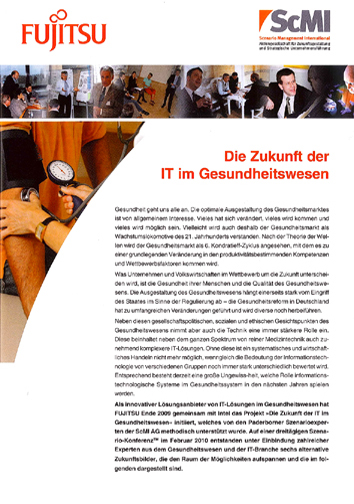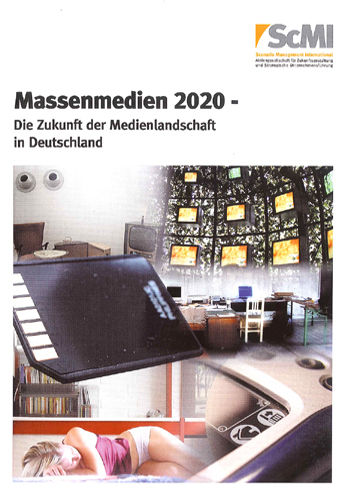High-quality care through a competitive health care system with solidarity-based financing: In a prospering and individualized society health becomes one of the main future topics. The public authorities rely on an active health policy which involves all the decision-making levels of the countries from the federal government and the European Union. They establish a public financing on solidarity principles and create a framework for more competition. The health care system guarantees high-quality basic medical care and coverage, whereby the service provision takes place increasingly as part of diverse and integrated care models. At the same time, health has become a global growth market where companies position themselves successfully and where the German health care has become attractive for foreign patients.
High-quality care in a globalized health care industry: in a prospering society of responsibility, health has become one of the main topics as well as a global growth market. Many people are health-conscious and the politics create – especially at the federal and EU levels – a framework for a competitive health care system. Its financing is carried out primary through insured persons within the public health care as well as through increasing private provision. The diverse health care system, including Hartz IV approaches, guarantees a high-level basic medical care and coverage. German companies and service providers position themselves successfully on the global markets.
High-quality health care as a standard with health-related leisure industry as a separated growth market: In a booming and individualistic society of opportunities, health is “in a literal sense” guaranteed through high-level basic medical care and coverage and it is taken for granted. Most of the people pay more attention to superficial aspects and they consider “health” as a lifestyle. Thus, the leisure-oriented health industry is developing itself as an independent growth market besides the strongly privatized “first” health care in terms of financing and service provision, which is characterized by health insurances and pharmaceutical companies. Both sub segments are strongly globalized, whereby German companies position themselves successfully and service providers push the “lifestyle location Germany” forward.
Scenario 4 operates in an environment with high growth, strong competition, a reserved policy and with problems in basic insurance. The European health policy secures high-level care and competent handling with new diseases – at the expense of a “health divide”: in a strongly deregulated and progress-oriented society of opportunity, health has become an important issue and also a global growth market. In light of new and severe symptoms, the EU has become a central player in the health policy. Relying on technological innovations, for example in the biotechnology, and establishing a health care funded by the private sector and created by private service providers where a great majority have access to high level coverage. German companies and service providers position themselves successfully, whereby they are increasingly no longer recognized as national providers.
Increasing responsibility within private health care and low-price segment: In a deregulated society people pursuit of safety, community – and thus also of health. Since the economic development is rather modest, fewer and fewer people can afford the full services of health care (or even merely healthy nutrition) which is bound to private financing. At the same time, they are very demanding and critical as consumers and patients, so that a strongly increasing market for low-price-health is developing where elements of the leisure-oriented health care industry are integrated.
Escaping from privately funded, inferior, public health – Germany is being left behind in the growth cycle: In a society that is falling back into global competition, the people are yearning for safety, community and for wealth that is lost. In this situation health is not a central topic (any more). The state limits the public expenditures for health and shifts an increasing part of funding into private provisions. Since the attractiveness of the market for private investors is limited, the health care will still be supported by public providers who can only guarantee a reduced basic care as well as limited coverage.
Freedom of players, driving employment – but decline in standards: an increasing number of people see the cause for the economic crisis and the declining wealth rooted in globalization and deregulation. Therefore, it came to a Renaissance of policy during which health care is seen as a public good and privatization is being halted and in some cases even reversed. In doing so, the federal government and the federal states are aiming that the health care industry acts as a motor for employment. During the definition of the national health care system, they rely on self-organization of the service providers in integrated care models, which consequently cements the traditional structures rather than sustainably improving the quality of care.
Insured persons and taxpayers finance the rigid health care system with low-quality of care: In a stagnant economic environment, people seek for safety, cling to the present and refuse changes. In the health care sector the federal and state policy is not able to establish new structures in spite of strong regulation. Resulting fiscal gaps are plugged continually through additional contributions or state subsidies. Many service providers act in a competition-oriented environment and the quality of basic care and coverage decreases rapidly. Even politically desired prevention fails due to the conversion.
Scenario 9 describes a possible future in an environment of low growth, little competition, active regulation and basic insurance problems. National health policy ensures high quality basic medical care. However, lack of innovation drives patients abroad: In a society characterized by economic problems, many people strive for safety and rely even more heavily on the capability of politics. In particular the federal government considers the health policy as a main topic, whereby it relies less on new structures but rather on efficiently shaping the existent health care system. In particular, through information technology a high-level of coverage is being established. The Achilles’ heel of the development is the low level of innovation, leaving Germany lagging behind international standards in terms of new technologies and processes as well as in challenging additional services.
New Global Scenarios
Eight scenarios for the future of the global world order. An open process with survey results of more than 200 experts from 65 countries.

The future of mobilty in rural areas 2040
Together with experts, we analyzed the topic of rural mobility from a variety of perspectives. This online scenario process has produced eight alternative visions of what mobility beyond the frequently considered metropolises might look like in the future.

Post-Covid-Scenarios
In an open process, future scenarios and perspectives for the time after the Corona pandemic were developed together with more than 80 experts.

Health Data Scenarios - How data will shape the healthcare system of the future
Digitization is a key driver of the future healthcare industry. The DayOne scenarios are about what the data-driven healthcare system of the future could look like.

The future of cryptocurrencies
Are cryptocurrencies more than just hype? And will they have a long-term effect on the banking and financial system? We have developed six scenarios that describe the future of cryptocurrencies.

The future of our inner cities
What impact will digitization have on our city centers? How do city centers influence our quality of life? What about the issue of sustainability in society and what role will the city center take on in the future?

The impact of the Corona pandemic on the future of the food industry
On behalf of the Bavarian State Ministry of Food, Agriculture and Forestry, the Nutrition Cluster, the Competence Center Nutrition (KErn) created scenarios for the future of the food industry after Corona and evaluated them against existing nutrition scenarios.

The Future of Artificial Intelligence in Retail 2030
Artificial intelligence is one of the most important future trends, also in retail. But what will the development and spread of AI look like in the future? This is the question addressed by the current scenario study of the EHI Retail Institute.

Post Corona Scenarios
In an open process, future scenarios and perspectives for the time after the corona pandemic were developed together with more than 80 experts.

The Future of Urban Mobility 2040
ScMI and 10 partners created scenarios concerning the future of urban mobility in 2040. In addition, the eight resulting scenarios were evaluated in order to allow for an internal strategic usage.

AI-based work environments 2030
Artificial intelligence is one of the most frequently discussed topics in politics, business and the media. In a scenario report prepared jointly with foresightlab for Fraunhofer-IAO, six scenarios were developed and evaluated by a group of experts.

How BMW Motorrad Explores the Future of the Global Motorcycle Market
The global motorcycle markets are changing. As part of its "Strategy 2030", BMW Motorrad therefore wondered what changes are to be expected and how shifts in market segments and market environments can be continuously monitored.

The Future of the domestic Furniture Industry 2030
As part of a joint project, the furniture companies Germania, Pelipal, Sachsenküchen, Schoeller, Egger and Hettich created together with ScMI scenarios for the future of the domestic furniture industry.

The future of the food industry
On behalf of the Bavarian State Ministry of Food, Agriculture and Forestry, the Nutrition Cluster, the Nutrition Competence Centre (KErn) and a 17-member panel of experts drew up and evaluated scenarios for the future of the food industry and presented them at the "Future Days Lebensmittel".

Germany 2030 - a map of the future
Germany is on sight. It is high time for a discourse on the future role of Germany in Europe and the world. The Initiative D2030 has developed eight scenarios and a map of the future in a cross-party open source process - supported by ScMI AG.

The Future of Trade Logistics 2025
Anyone who takes a product out of the shelf at the point-of-sale or happily opens the door to the parcel carrier will not always know what logistical processes are caused by the purchase decision or chosen delivery option. The uprising question is, how trade logistics could change in the future? How could store, transport or warehouse logistics look like in 2025?

The future of space travel and it's consequences for safety and military operations
armasuisse is the Competence Center for Procurement, Technology and Real Estate within the Federal Department of Defence, Civil Protection and Sport (DDPS).

Szenarien zur Zukunft von Afrika 2030

European Border Management

The future of the ship building and offshore supplier industry 2024
The ship building and offshore world market is subject to strong cyclical fluctuations. In order to establish a long-term orientation, the VDMA working group, representing shipbuilders and offshore suppliers created various scenarios in a scenario conference.

Integrated scenarios within the scope of the national sustainability strategy
As part of a project initiated by the German Federal Environmental Agency, scenarios were developed which shed light on the conditions for the national sustainability strategy and demonstrate sustainable strategic approaches for leisure, nutrition and housing.

The future of the domestic furniture industry 2025
As part of a joint project the Association of Woodwork together with the Furniture Industry of North Rhine Westphalia, comprising of; Hettich, Technocell Dekor, Egger and JAB Anstoetz, created six scenarios for the future of the domestic furniture industry.

The future of sports in Germany 2030
Sport is a social, cross-sectional topic which goes far beyond just competitive and leisure sports. Topics such as health, media and entertainment as well as new business options were discussed in a scenario study where six possible futures were created for sports in Germany.

Living together 2030
Within an integrated project, seven scenarios for "living together" in the year 2030 have been developed. These scenarios have long-term consequences for Generali Versicherungen,so that they have been published within a scenario study for internal employee communication.

Future scenarios for retail communication 2025
Together with marketing managers for retail, media representatives and service providers the EHI Retail Institute has investigated the communication and shopping behaviors of future customers. The systematically identified scenarios created provide an insight into possible forms of communication between consumers and retailers until the year 2025.

Development of external scenarios for the IP-management of medium-sized technology companies in Europe 2020
In a project with international professionals the University of Applied Science FH CAMPUS 02, the IMG GmbH and ScMI created seven scenarios for the future of intellectual property. Additionally, they developed strategic options for medium-sized technology companies.

Future added value in Germany
How can Germany, due to changing conditions, adapt its industrial strategy which managed to lead them successfully through the financial crisis? In a working paper the central forces of change are demonstrated as well as challenges and alternative futures outlined.

Coach-based travel in Europe 2030
To be preapared for different changs in the coach-travel industry, the Bus-department of MAN Truck & Bus AG initiated a project with several experts from the automotive area, further industries and representatives from related associations to develop alternative future scenarios.

The future of the Agribusiness in Germany 2020
AGRAVIS Raiffeisen AGhas developed and assessed six scenarios for the future of the Agribusiness in Germany. These alternative futures have been presented and discussed in the management team and additionally published in an internal scenario study.

The future of our groceries
On the occasion of the ANUGA 2011, the German association of food trade (BVL) and the Cologne trade fair (Koelnmesse) initiated, together with a team of experts, scenarios concerning the future of our groceries and published them in a scenario study.

The future of health care in Germany 2020
As a think tank and service provider for the government, the Innovation Centre in Lower Saxony, together with ScMI, created scenarios for the future of the “healthcare industry”. The future scenarios, which are demonstrated in a scenario study, should stimulate thought processes and discussions.


The future of social networks on the Internet
In the first half of 2010 the first online scenario project was implemented in the XING-group “Szenario-Technik und strategische Früherkennung im Zukunftsmanagement” (“Scenario technique and strategic early detection in future management”). As a result, six scenarios were created concerning the future of social networking via the internet.

Scenarios for the future of football in Germany 2025
How could football look like in 2025: national sport or a billion euro business? Champions League or substitutes’ bench? Six scenarios describe different development trends of the soccer environment in Germany.

The Future of Eastern Europe 2030
In the face of multiple uncertainties, ScMI has developed six scenarios for the future of Central Eastern and Eastern Europe. These scenarios consider the development of the current EU member states and the rest of Eastern Europe as well as specific regions such as the Balkans and the Caucasus.

The future of intangible web goods
In contrast to physical products and classic services, “Intangible Web Goods” such as MP3-Files or e-learning offers were previously available free of charge on the Internet. Five scenarios showed how this might change in the future.

Visions for retail marketing
In collaboration with representatives of the retail industry, the branded goods industry, media as well as representatives of the IT and advertising industry, EHI developed visions for trade marketing in 2015 through an intersectional scenario project. You can find a follow-up study conducted in 2013 here.

The future environmental education in Germany
As part of a three-day scenario conference, 26 representatives from various centers of environmental education systematically analyzed and structured future trends, summarized them and created, in total, six scenarios representing the environmental education in Germany.

The future of European tourism 2020
All the stakeholders in the tourism industry – from travel agents, hotels and transport companies to leisure time facilities are affected by a major structural change. Five scenarios show various potential directions.

Mass Media 2020
Media offerings in Germany have risen considerably over the past few years. Six scenarios show to what extent the so-called “new media” substitutes the traditional “mass media”, whilst also showing to what extent they are complementing each other.

The future of nutrition. Scenarios and perspectives for the future of nutrition in Germany
Whether food scandals, obesity or genetically modified food: topics that deal with our nutrition are published in the news on an almost daily basis. ScMI shows six possible developments through six scenarios. Here You can find a thematically similar study conducted in 2011.

Scenarios of global finance and economic crisis
ScMI has analyzed the scenarios developed by many renowned institutes of economic and of future research and connected them by using the Szenario-ManagementTM approach. The results are seven comprehensive scenarios which summarize the current state of knowledge.

The Economic outlook
What role do various companies play within our economic future – from small family businesses to global corporations – employees to consumers? Four scenarios from a project run by ScMI provided some insightful possibilities.

Die Zukunft des Marktes für Corporate Finance
Ist der Corporate-Finance-Markt für Kreditinstitute ein Markt mit Perspektiven oder steckt er in der Sackgasse? Diese Frage hängt von verschiedenen Faktoren ab, deren zukünftige Entwicklungsoptionen ermittelt und in sechs Szenarien vorausgedacht wurden.

The future of Europe’s regions
The five scenarios about the future of the European regions were developed during the 1st ScMI-Partner-Conference in autumn of 2002. At the conference ScMI brought together its network partners plus further experts from even European countries.

The future of sales of new vehicles
In the slipstream of big fusions, there are signs of changes which strongly affect the image of the automotive industry. The central question is how consumers will buy new vehicles in the future. Six alternative scenarios were created on this issue in cooperation with the Fraunhofer Application Center for logistics-oriented business economics.

The future of civil aviation
Following the events of September the 11th it became clear that even in the aviation industry a stagnation or a decline in growth can occur. Therefore, ScMI has created five scenarios concerning the future of civil aviation which were evaluated by selected experts from airlines, airports and aviation suppliers.

The future of municipals in Germany
The development from municipalities and regions to modern service organizations is a central issue. Cities, municipalities and districts have to act more and more strategically. This scenario report is based on a pilot project “Kommune 2005”.





